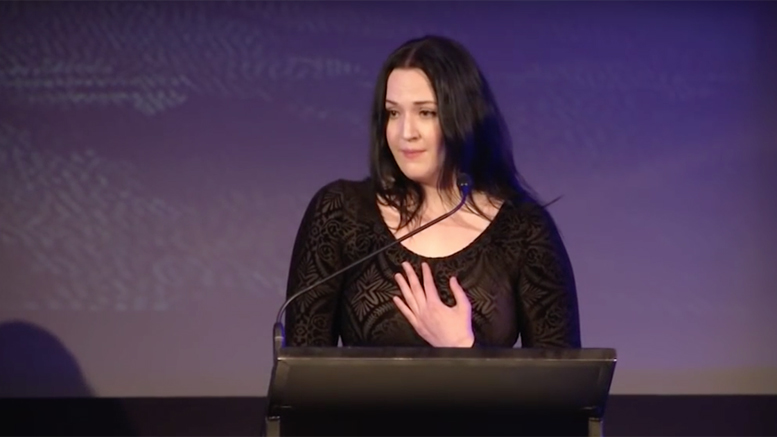Millie Fontana is an atheist raised by lesbian parents who–with the support of her mothers and also her biological father–has been speaking out against same-sex marriage. She stands with Christians (as she puts it) because only Christians are advocating for children in contemporary debates surrounding sexual ethics and law. Here she is, speaking with Ryan T. Anderson, at a conference in Australia. I think the video is well worth watching. (As usual, folks on email will have to visit the site to see the embedded video. Sorry.)
She makes a number of very good points, but here is one that I think was the most interesting. When asked by one of her mothers whether or not she would have felt more stable and secure if her mothers had been allowed to get legally married, Fontana replied with a question of her own: “How would psychologists have treated me for my underlying issues of fatherlessness if to acknowledge fatherlessness was a form of discrimination?”
Now that same-sex marriage is the law of the land in the United States, there’s a sense in which you might say that this is a moot point. Legally you could be right, although I’m not certain. Some once-controversial issues become widely accepted, such as interracial marriage. Others, however, like abortion remain cultural sticking points for decades with no end in sight. It’s too early to tell which of these categories same-sex marriage will fall into, but there is certainly precedent for the possibility that Obergefell was not the last word any more than Roe has been. In any case, however, another point that Fontana made is certainly worth considering:
Until we as a society have a discussion that . . . includes everybody who has been raised fatherless or motherless, until this discussion stops shaming children in my position from coming forward, we should not be pushing marriage through. I am not going to stand here and be silenced by people telling me what was acceptable for me to feel, that I’m a bad person for wanting a father, that maybe I didn’t love my mothers enough because I wanted a father. It’s bull. And I won’t support it.
Everybody deserves a voice.

“How would psychologists have treated me for my underlying issues of fatherlessness if to acknowledge fatherlessness was a form of discrimination?”
The same way a white child adopted by black parents would be treated for any issues the child felt that upbringing created. Or a child brought up by poor parents, or autistic parents, or brilliant parents, or famous parents. Whether or not fatherlessness is discrimination (a silly question, since we allow children to be raised in better and worse circumstances all the time), psychologists can help kids deal with any issue, no matter how politically touchy.
I get why someone saying these things is a really appealing speaker. That very fact ought to make us react very critically. Just as both sides love the personal stories of former opponents who saw the light and became allies, both sides love to hear from people who say they’re well-positioned to prefer the opposition, but prefer them instead. Anything which seems self-serving or carefully crafted to get more attention should be viewed very skeptically indeed.
So, that said, it’s her reasoning and command of facts which may carry her argument. I find particularly puzzling the inference from her experience to the needs of all children, because that seems to require silencing the voices of those happily raised by same-sex partners. Moreover, the line about discrimination sounds great until you put it into any other context. For example, my parents were Catholic, and forced me to attend religious education until I was sixteen despite my lack of commitment to the faith. I hated it, and felt as though it was one of many ways that the religion in which I was embedded was based on deliberate deception (tacitly consented to by authorities) and forced such deception on kids. But lots of people grow up happy Catholics, and benefit from the support of their churches. I could talk perfectly comfortably about my experiences because I recognize that they were just my experiences. That Catholicism didn’t suit me personally and has some features I find problematic doesn’t entail animus against Catholics or advocacy of reduced rights for them. As Ryan suggests, even if it were discrimination, one could talk about it with a therapist. Is her view that racists shouldn’t be able to get help, or that she’d be the first person to admit to conflicted feelings about same-sex relationships in a private, confidential space? I just don’t see the obstacle she seems to.
Also, homophobia was there for a reason? Really?
I’m also pretty opposed to her view that parents don’t have the right to choose what to divulge to their children about their families. Does anyone think that opposite-sex parents have no right to withhold, for example, facts about an institutionalized uncle, or an incestuous conception, or whatever they think it in the child’s best interest to refrain from sharing at that particular time?
Similarly, the substantive objections she has to same-sex parenting are in no way dependent on the speed of the change or the extent to which it hasn’t been a consensus issue. She’s not saying that she opposes same-sex parenting now, but in another fifty years, she plans to be fine with it–her arguments will apply equally later. So what relevance does the way the legal change came about have?
I understand why she’ sa thrilling speaker for those opposed to same-sex marriage, but her reasoning struck me as very poor.